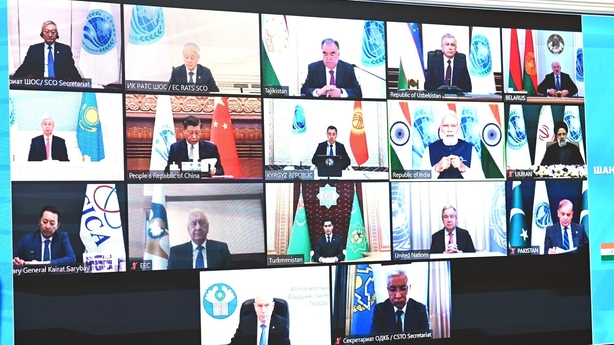More than a week after the Wagner Mercenary Group's fleeting mutiny against the Kremlin's military leadership, Russian President Vladimir Putin has sought to reassure Asian leaders of his country’s stability.
"The Russian people are consolidated as never before," Mr Putin told a virtual meeting of leaders of the Shanghai Cooperation Organisation, a security alliance of central and south Asian countries, which includes China and India.
Mr Putin also thanked SCO member states that had "expressed their support for the actions of the Russian leadership".
During his speech, he said that Russia would stand up against Western sanctions and "provocations".
Witold Rodkiewicz, an analyst on Russian foreign policy, told RTÉ News that it was a "propaganda statement" by Mr Putin, and that he was, "repeating all the same points since the start of the war, of Russia being a victim of aggression".
"If you have to say that your country is stable, then it clearly means that your country is not stable. It means something is not right," said Mr Rodkiewicz, senior fellow at the Centre for Eastern Studies in Warsaw.
"I would be surprised if the Chinese leader or the Indian prime minister had felt the need to say that their countries were stable."
Mr Putin said that Russia intended to improve ties with the SCO, which is a club of mostly autocratic countries.
Russia maintains close trade ties with many SCO members, and Mr Putin said that he supported a transition to payments in local currencies for foreign trade.

Founded in 2001, the SCO is comprised of nine permanent members states: Russia, India, Kazakhstan, China, Kyrgyzstan, Pakistan, Tajikistan, Uzbekistan, and its latest member, Iran.
Afghanistan, Belarus, Turkey and Mongolia have observer status, and another six, including Azerbaijan, and Armenia, have dialogue status.
"It's a secretive organisation. You can’t really find out what they’re doing," said Mr Rodkiewicz.
He said that Russia and China used the organisation to pressure "a loose club of countries" into an anti-Western agenda.
All but two members of the SCO are ranked as either authoritarian or hybrid regimes, countries where elections are unfair and the government bullies opposition parties, according to The Economist Intelligence Unit’s 2022 Democracy Index.
Using the same index, India and Pakistan make up the SCO’s only two democracies.
During its early years, the SCO managed to successfully demilitarise the former Chinese-Soviet border, but, according to Mr Rodkiewicz, the club's agenda became "diluted" after India and Pakistan became members.
"There's an anti-terrorist part. But, in practice, what kind of anti-terrorist policy can you put in place when you have India and Pakistan in the same room. They can't even agree on the list of terrorist organisations," said Mr Rodkiewicz.
A joint declaration by the leaders at the end of today's online meeting, hosted by India, said that the SCO opposes the resolution of international and regional issues through "collectivisation, ideology and confrontational thinking".
Member states, including Russia, which invaded Ukraine 16 months ago, also emphasised their support for "the principles of mutual respect for sovereignty, independence, territorial integrity of states".
The declaration includes key concepts from the "Chinese ideological manual", said Mr Rodkiewicz.
"Russia is increasingly subscribing to that, allowing China to set the agenda in terms of ideology."
Additional reporting by Reuters







